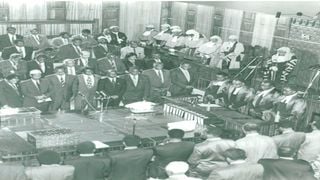
The Kenya House of Representatives (Parliament) in this photo taken on April 28, 1966, passes legislation that would require dissident MPs to resign and seek re-election on a new mandate following a marathon sitting.
| File I Nation Media GroupOur Columnists
Premium
Public service and constitutional neurosis
One would think, given the analysis submittted here last week, that the context and rationale of Riggy G’s ‘shareholder’ intervention is fairly straightforward and entirely uncontroversial and that, ipso facto, the furore which greeted it’s utterance is no more than a storm in a tea cup.
Yet insofar as we propose to approach this matter with any measure of candour, we must instantaneously internalise the fact that as long as we remain engaged in what is fundamentally a political discussion, political storms are par for the democratic course, and political tea cups are notoriously susceptible to them.
In the circumstances, attending to what the politics wants is an eminently sensible enterprise, and it is thus: the struggle for a new constitutional dispensation was not just a quest to entrench political pluralism and fundamental human rights.
It was also a determined effort to liberate the public service in terms of both the bureaucratic civil service and national administration, from illegitimate annexation by the political sector.
Arguably, this is the most fundamental and least appreciated dimension of that struggle, because in it, Kenyans were grappling with the inter-related moving parts of a complex machinery.
The purpose of designing our system of governance around an elected executive is to anchor the governing mandate on the sound principles of transparency, accountability, responsiveness and democratic legitimacy.
In so doing, the people of Kenya no longer wished to delegate their foundational political responsibility of exclusively exercising the ownership and use of sovereign power, and ensuring that at all times, it is deployed in their interest, with their authority and towards the ends of advancing their well-being.
The requirement of adequate capacity to assure these ends is the constitutional basis for a strong state and a legitimate government.
The democratic principle enables the people employ and control a political leadership that is answerable to them, and to ensure that these agents take control of the machinery of state only as a vehicle for implementing their wishes.
The machinery itself is apolitical and impersonal, responding only to the lawful commands of a legitimate political executive. At the same time, the elected leadership is answerable to the people, through democratic, political structures and processes.
Therein lies a mystifying paradox whose appreciation engenders reflexive public suspicion: the uneasy union between a component wholly dedicated to the acquisition and retention of authority by political means in the context of a rivalrous democracy, and a neutral instrument obligated to execute the command of this authority impartially, inclusively and without regard to political exigencies.
The constitutional shift was to bind all persons exercising any authority whatsoever that may intersect with public interests, to the robust restraints of the national values and principles of governance set out in Article 10 and concomitantly establish a comprehensive leadership and integrity framework under Chapter 6 which expounds how these value and principles play out in practice, for both the politicians and bureaucrats in the Executive and other branches of government.
For further clarity, various chapters are headlined by a statement of values and principles, demonstrating a particularly neurotic constitutional vigilance respect to the exercise of public authority.
This is the framework under which the elected portion of the executive is mandated to discharge its political undertakings by operating in an exemplary, responsive, responsive manner, and by which the civil service is bound to obey its political master without mutating into a partisan political agency.
It is essential for national stability and the efficient and inclusive delivery of public services that the civil bureaucracy remains categorically apolitical at all times.
Nobody wants a return to the unpleasant scenarios of the past: civil servants mobilising for politicians, including fundraising by extorting citizens in need of services, or politicians acquiring the power to demand and expect civil servants to gratify their private desires, from vulgar physiological imperatives to the exigencies of political strategy.
Neither is it desirable for it to be possible to accurately map the political commitments of senior civil servants, on the basis of ethnicity or explicit party affiliations, as happened in the Grand Coalition Government.
This is what Kenyans are uncompromisingly vigilant, and even fanatically hostile to. The neurosis which suffuses the constitution should place the matter well beyond controversy.
And the innovation to manage the insoluble paradox has been to introduce a deciduous layer of public servants in the form of an ‘adviseriat’, whose purpose is to facilitate the actualisation of the governing mandate by aligning the strategic platform of the political element with the instrumental capacity of the bureaucratic element, without compromising the implicit and explicit boundaries which separate them.
These are the dimensions of a necessary win-win whose scrupulous observance gives the people of Kenya much comfort and respite from the traumatic dysfunction and toxic corruption of recent memory.
Mr Ngéno is an advocate of the High Court





